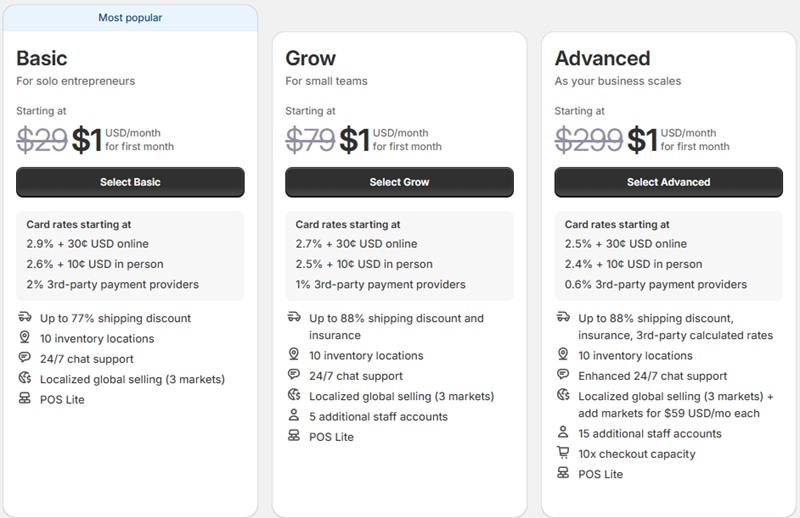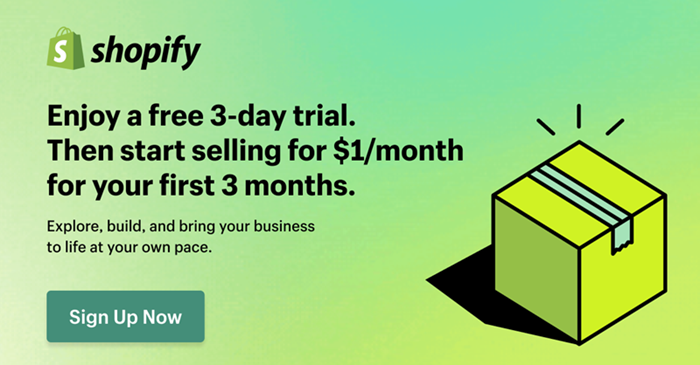My content is reader-supported by awesome people like you. Which means I could earn a commission. Learn more here!
When it comes to building an eCommerce website, the modern business owner has a ton of options.
“eCommerce” refers to the act of buying and selling goods and services over a digital medium, like a website.
Today, there are many platforms that offer complete creative control, advanced marketing options, third-party plug-ins, and other cool features that can really set an online store apart.
But, not every eCommerce website builder is right for every store.
For example, a small boutique shop won’t need advanced scalability, but a major retailer will definitely need advanced shipping and promotional discount features.
Shopify and Ecwid are two website-building options with different features, pros and cons, and pricing.
This guide will do a deep dive into the two platforms and declare which is the best overall for eCommerce.
What is Shopify?
Shopify is a popular eCommerce platform that has some major street cred.
Many large retailers, including Allbirds and Hasbro, use Shopify and take advantage of everything the platform offers.
With advanced eCommerce features, priority customer support, robust reporting data, and tons of exciting integrations, it’s no wonder that Shopify has helped over a million businesses scale up and reach new audiences.
While Shopify markets itself as a one-stop-shop solution for both beginners just starting out and experts ready to move on to the next level, the platform really works best for businesses that handle high sales volumes on a daily basis.
What is Ecwid?
Ecwid is an eCommerce plug-in designed for building your own online store.
It also offers everything you’d need to sell an entire catalog of items, including adding an inventory with templated descriptions, photos, pricing information, discount codes and more.
You can closely monitor transactions, analyze consumer data, generate buyer profiles, and control shipping and promotional discounts.
You can do this all from the control panel, a central design place, for a flat monthly fee.
One thing to note, however; unlike Shopify, Ecwid is a separate widget plug-in, and isn’t a platform of its own.
Ecwid operates on a SaaS (software as a service) cloud-based model.
This means that you don’t create a free-standing online store from scratch.
Ecwid recently added a new feature called “instant sites,” which offers a free, one-page website that can be set up in minutes, but these aren’t very customizable, nor do they have advanced functionality.
If you already have an existing store and want to use Ecwid, Ecwid will send you a widget to attach in the form of HTML code.
You can embed the code directly into your website or on your social media profiles and voila!
Your online store will appear instantly.
Pricing & Fees
Ecwid Pricing
Free Plan
If you want to sell 10 or fewer products, Ecwid is free.
This plan is great for small businesses that don’t sell digital goods or need advanced SEO options.
Ecwid Venture – $15/mo
With this plan, you can sell up to 100 items.
Ecwid Business – $35/mo
With this plan, you can sell up to 2500 items.
Ecwid Unlimited – $99/mo
With this plan, you can sell an unlimited amount of products and have more options for custom development.
Shopify Pricing

Shopify offers a 14-day free trial, which you can cancel or upgrade at any time.
There are also three premium plans to choose from:
The Basic Shopify Plan – $39/mo
With this plan, you can sell an unlimited amount of products and sell on both online marketplaces and social media platforms – best for new businesses unfamiliar with online selling.
Grow – $105/mo
With this plan, you get professional reporting and up to 5 associated locations – best for growing businesses with 1 retail store.
The Advanced Shopify Plan – $399/mo
With this plan, you’ll access everything Shopify has to offer, including third-party calculated shipping rates and advanced global selling tools – best for growing businesses with 2+ retail stores.
As you can see, the most expensive Shopify plan costs far more than the most expensive Ecwid plan.
But, if you’re a major retailer, you may be able to justify the cost if you’re selling high volumes of products every day.
eCommerce features of Shopify v.s. EcWid
Ecwid and Shopify both market themselves as having the best eCommerce features on the market today.
But, at the end of the day, which is better for selling goods and services online?
Payment Options For Both
If you want a variety of payment options, Ecwid has you covered, offering tons of options for handling transactions and checking out.
Buyers with a PayPal account can use the platform for credit card transactions and, luckily, you won’t get charged extra fees on top of PayPal’s commission.
Ecwid also has over 70 other payment getaways you can connect.
While many are based on country, popular getaways Stripe and 2Checkout are easy to connect and apply everywhere.
Some, however, do charge an extra fee to connect, but you really only need a wide variety of payment getaways if you’re expecting high sales traffic from around the world.
Somehow, Shopify just edges out Ecwid in payment getaways, offering over 100 options to add to your store and offering all of the same features as Ecwid.
Shopify even has its own payment getaway called “Shopify Getaways,” but you can only use this if you’re selling from Shopify’s list of specific countries.
Shopify Payments is very simple to set up and you avoid all transaction fees.
Product Options, Categories & Limits
With eCommerce, selling products and displaying them in an attractive, aesthetically-pleasing way is the name of the game.
In terms of how many products you can sell, Shopify allows you to host a lot more products than Ecwid, even at the most basic price level (although Ecwid still offers the free plan, where you can sell up to 10 products.)
But, with Ecwid, the only way to sell an unlimited amount of products is to buy into the plan that costs $99/mo.
If you have a lot of products to sell, this is definitely something to consider.
In addition, you can sell both digital and physical products on both Shopify and Ecwid, like eBooks, digital files, and online services.
With Shopify, you will need to download a third-party app, and only expect file sizes up to 5GB to be supported.
On Ecwid, you can sell files with a size up to 25GB.
Shopify also gives users three options for customization on each product.
So, you could list a product and sell it in a different size, color or design.
If you want to get around this, you can download Shopify’s third-party integrations that allow for more product diversification, but this can be a bit of a hassle for only a bit more diversification.
Ecwid actually beats out Shopify in terms of option flexibility, as it gives your customers an unlimited amount of options for customization.
A product category is a lumping or collection of all products in a certain line.
An online store can have several different categories, like home goods, clothes and shoes.
Luckily, both Shopify and Ecwid allow you to set up categories fairly easily.
Shopify just edges out Ecwid here, however, as their categories are “smart.”
This means that after you add some products to a collection manually, you can create templated conditions for future products.
So whenever you add a new product, it will get automatically populated into a category based on the conditions you set, saving you a lot of tedious dragging and dropping.
Ecwid also has advanced filtering for categories, but it doesn’t match Shopify’s intuitiveness.
Shipping & Dropshipping
Ecwid offers three different options for shipping costs.
To define a shipping rate, you can set up an automatic calculator to compute a shipping cost based on the weight and number of items being sold whenever a customer checks out.
You can also charge a flat rate fee or, by using Ecwid’s shipping integrations, receive real time, direct charges from the carrier themselves.
Ecwid supports all major carriers, like UPS, FedEx, USPS, DHL and many more from all over the world.
In terms of carrier options, Shopify lacks compared to Ecwid.
You can only get real-time shipping rates from UPS, USPS, DHL Express, Sendle, and Canada Post.
Outside of this, you can access quotes from other carriers only if you have Shopify’s most expensive plan.
Shopify does offer better overall shipping discounts than Ecwid, but there are fewer options for those who don’t live in the countries primarily served by Shopify.
Dropshipping is a unique type of business model in that you accept orders as a seller, but you don’t keep the goods in stock.
Instead, when you sell a product using the dropshipping model, the item is actually purchased from a third party and is shipped directly to the customer and you don’t have to handle the product directly.
Both Shopify and Ecwid offer offline and online selling, as well as dropshipping.
Many business owners use dropshipping as it is a great way to avoid physical stocking and re-stocking and fulfilling orders all by yourself.
Both Shopify and Ecwid offer great functionalities to set up and monitor dropshipping, but be aware; this won’t happen immediately after you create your online store.
With both platforms, you’ll need to download an app to start searching for suppliers.
The app Oberlo, offered by Shopify, is a fan favorite for the Shopify business plan and offers advanced functionalities and analytics.
Ecwid offers Wholesale2be and other plug-ins, but they aren’t as strong as Shopify’s
Overall Pros of Ecwid
Build your existing site into an online store
With Ecwid, there’s no starting from scratch.
All you have to do is plug in the coded extension and you’re nearly done.
For users that are already comfortable with Squarespace or Wix, for example, adding eCommerce features seamlessly and without having to relearn a new tool is a huge benefit.
Very user-friendly
Ecwid is great for users who aren’t very technologically savvy and don’t want to go through the hassle of building a new website.
You also don’t need any extra coding knowledge, and options for product customization are robust and easy to understand.
Multi-language and multi-currency options
Ecwid is great for international sellers.
With Ecwid, you can translate your storefront into 50 different languages – when a customer visits your store from another country, they will automatically see product descriptions and categories in their home language.
Customers can also browse, see prices, and checkout in their own currency without any manual calculation on your part.
Ecwid offers the ‘Currency Converter’ app which, at $4.49 per month, allows you to display prices in local currencies automatically.
Overall Cons of Ecwid
Limited design customization
Because it’s a plug-in, Ecwid doesn’t share the same design capabilities as Shopify.
Ecwid gives you a pre-existing template designed to automatically integrate with any website, so don’t expect to edit beyond basic color and functional design changes, like adjusting the layout of your product images or navigating the pages.
Luckily, if you’re comfortable with CCS and can add in your own code, you can create a custom storefront and have greater freedom to design a custom theme.
In addition, Ecwid has some third-party apps that can help expand your design options.
The free plan is pretty basic
As it is free, you get what you (don’t) pay for with Ecwid’s Basic plan.
SEO is fairly limited and you can’t access the advanced tax functionalities many come to Ecwid for, or the 24/7 support you may need getting started.
Not ideal for large stores
There’s no doubt that Ecwid is awesome for beginners who don’t want to design an eCommerce site from scratch.
But if you’re looking to scale operations and start taking in thousands of orders a day on hundreds of products, Shopify is a better option.
Overall Pros of Shopify
Stunning, pre-set templates
Shopify offers a whole host of design templates that are fully mobile responsive and expertly tailored to many industries.
This is great if you’d like to avoid any manual designing yourself, and you can get inspiration from a wide range of other sites.
Built-in marketing and blogging tools
If you have a large customer base, Shopify lets you email up to 2,500 users at a time for free.
In addition, if you’d like to connect with your subscribers through a blog, Shopify’s blogging tool is easy to use, integrates seamlessly with social media profiles, and is image-friendly.
Large third-party app marketplace
Shopify has tons of third-party apps that can really take your website to the next level, many of which Shopify has designed itself.
Some do require extra payment, however.
Overall Cons of Shopify
Advanced data reporting is limited to the more expensive plans
If you really want to take advantage of all of the analytics features Shopify is known for, you will have to pay more.
Shipping can get expensive
If you don’t plan on using Shopify’s own shipping service for real-time carrier quotes, the same plan is extremely expensive otherwise.
Shopify Vs Ecwid FAQ
Can I use Shopify and Ecwid for free?
There is a totally free option for Ecwid. For Shopify there is a 14 day free trial.
Are Shopify and Ecwid good for beginners?
They both are great for beginners. Easy set up and a easy start regardless of your knowledge in building an eCommerce website.
Which one is more SEO friendly, Ecwid or Shopify?
Shopify is there better solution for SEO. More features and more control which benefits you when it comes to SEO.
How many products can you sell on Ecwid?
Free — 10 products. Venture — 100 products. Business — 2500 products. Unlimited — unlimited products.
How much does Shopify charge per transaction.
2.9% + $0.30 for online purchases. And for a physical purchase its 2.7% per transaction. If you use any payment gateway other than Shopify Payments, a 2% fee will be charged on every transaction.
Shopify Vs Ecwid Conclusion! Who’s the winner?
Overall, Shopify edges out Ecwid as the more comprehensive eCommerce platform IF you’re looking to grow an existing store or set one up quickly, as well as reach new audiences.
Shopify is also very responsive to consumer demand and has added a lot of intuitive features in recent years.
Ecwid is great if you’d like to keep your existing store and want to get into multi-channel selling, but don’t need major eCommerce solutions.
Both solutions have various pros and cons, so make sure to do some prior research before taking the jump on either one.





Leave a Reply